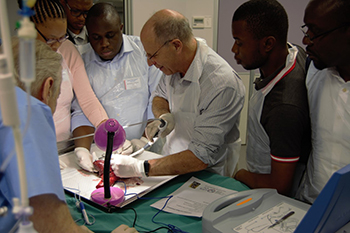Latest News Archive
Please select Category, Year, and then Month to display items
05 May 2023
|
Story EDZANI NEPHALELA
|
Photo Supplied
![]()
This audit process will assess the resources available and required for the implementation of a Language policy framework for higher education (2020) – such as the development of multilingual terminologies, translation services for teaching and learning materials, campus signage, as well as various multimedia collateral – including their quality and relevance to the needs of the students and faculty. The audit will include an assessment of existing resources and whether they are furthering implementation goals, and may also include the gathering of feedback from students and faculty to identify improvement areas.
Dr Nomalungelo Ngubane, Director of the UFS Academy for Multilingualism, said the process will help the UFS identify the essential languages resources that are available for the successful implementation of the 2020 Language Policy for Higher Education framework (LPHE). “The audit will identify how much has been done at the UFS and which institutions we can collaborate with, for example, in the development of Sesotho, so that we do not reinvent the wheel, but we close the gaps.”
Once the audit is completed, the institution will develop a plan for resource allocation to address the identified gaps. This may involve acquiring new resources, upgrading existing ones, or reallocating existing resources better to meet the needs of students, staff, and faculties.
Due to the impact this audit will have on various stakeholders, all staff and students are encouraged to participate. To attend the audit, please RSVP here by 30 May 2023.
Great turnout for Hannes Meyer Symposium in Cardiothoracic Surgery
2017-05-05

Symposium attendees watch attentively as
Dr Johan Brink demonstrated a MAZE procedure
with a pig’s heart.
Photo: Supplied
The University of the Free State’s Faculty of Health Sciences hosted the annual Hannes Meyer Symposium in Cardiothoracic Surgery. The symposium was organised by Prof Francis Smit, head of the department of Cardiothoracic Surgery at the UFS, with the support from the Society of Cardiothoracic Surgeons of South Africa and the European Association of Cardiothoracic Surgery (EACTS). Over the past 16 years this symposium has steadily been growing in stature and prestige leading to the resounding success that was this year’s event.
Medical advancements explored
The aim of the symposium is to provide an overview of the latest advances in Cardiothoracic Surgery and perfusion as well as providing hands-on training via simulation to trainees from South Africa and the rest of the African continent. Didactic lectures and papers by registrars were an integral component of the symposium. The South African community was represented by various heads of departments, trainees, senior specialists and perfusionists from all the training centres in the country. There were also delegates representing Uganda, Mozambique, Nigeria and Zambia.
Heart surgery off to new heights
Simulation in Cardiothoracic Surgery and Perfusion can be compared to airline pilots with high risk, with complex surgeries being first done in simulators before being attempted in the real world. The UFS is proud to have a state-of-the-art simulation facility, which was used to facilitate the programme.
The range of simulation was extensive and included simple procedural models to complex full theatre setups with Human Performance Models in perfusion that simulated crisis scenarios with the aid of computerised devices that react in real time to human intervention.
Industry support highly appreciated
This event was coordinated by Dr Jehron Pillay, senior registrar in the Department of Cardiothoracic Surgery and Marilee Janse van Vuuren, deputy-director clinical technology, in the department. This was the first time that such extensive simulation models were used in the programme and judging from the positive response received, it has certainly set the benchmark for all future events.
The event has received invaluable support over the years from EACTS that has selected Bloemfontein as the site of its African training programme as a result of the high level of training and education achieved here.
The academic discussions were chaired by Profs Marko Turina and Jose Pomar (past presidents of EACTS) and Pieter Kappetein (past secretary general of EACTS) who are extremely well known internationally for their contribution to advancing Cardiothoracic training and education.
Our guests from EACTS presented didactical lectures on research methodology, international randomised trials and discussed recent developments and controversies in cardiothoracic surgery.
Registrars from all South African units presented a thoracic and cardiac surgery paper from each unit highlighting specific disease conditions, moderated by heads of departments and the international panel.
An event of this magnitude requires significant financial support and the medical industry in South Africa stepped up to the plate in providing financial and logistical support in order to make it possible.